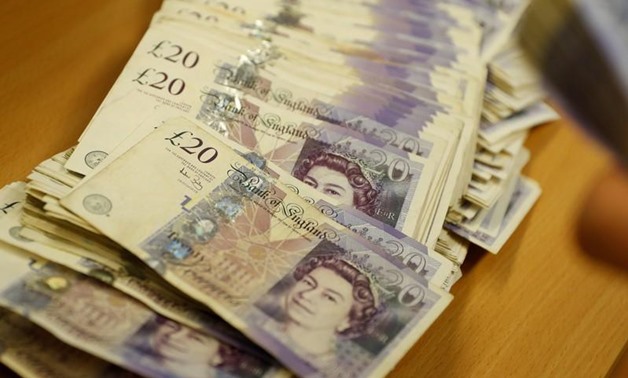
British Pound Sterling banknotes are seen at the Money Service Austria company's headquarters in Vienna, Austria, November 16, 2017. REUTERS/Leonhard Foeger
LONDON - 22 May 2019: Sterling fell broadly on Wednesday and was on track for its biggest ever losing streak against the euro as Prime Minister Theresa May’s last-ditch Brexit plan failed to win over either opposition lawmakers or many in her own party.
With the plan appearing dead in the water, some traders said they saw a rising chance of Britain leaving the European Union without a transition deal.
The pound fell 0.3% to $1.2663, its lowest since mid-January, and weakened a similar amount against the euro to 88.135 pence. It is set for the 13th straight day of losses against the euro, the longest losing streak since the euro began trading in 1999, according to Refinitiv data.
“The action from Labour and eurosceptic Tory members were quite negative and an updated deal passing parliament looks quite distant now,” said Nomura FX strategist Yujiro Goto.
“It may depend on the result of the EU parliamentary election over the weekend, but this could mean May resigns over the weekend. It was generally expected by the market, but it became clearer yesterday.”
The EU parliamentary election is due to run from Thursday to Sunday, and opinion polls suggest Nigel Farage’s Brexit Party will poll strongly.
In mid-March, banks informally canvassed by Reuters saw a diminishing chance of a “no-deal” Brexit.
This week though there were signs some were changing their mind, with JPMorgan upping its probability of a no-deal Brexit to 25% from 15%. Another bank, Nordea, raised the chance of no-deal Brexit to 15%, compared to 10% in March while Mizuho strategists now see no-deal chances rising towards 50%.
“Personally, I suggest chances of no-deal (Brexit) is nearer 50% given the way things are shaping up right now. Looking for lower sterling-dollar trend to continue into the EU election and beyond,” said Neil Jones, head of hedge fund currency sales at Mizuho.
Others stuck to previous forecasts ranging around 15-20%. JPM also said it was expecting a national election and Brexit delayed to year-end.
Broader market positioning on the pound suggested more volatility in store for the British currency. Outstanding net short positions on the pound were whittled back sharply in recent weeks when hopes grew that May could secure a deal.
With positioning broadly neutral, sterling has become more vulnerable to headline-driven selloffs.
WHAT INFLATION?
Data on Wednesday showed British inflation rose last month by less than investors and the Bank of England had expected. But it still hit its highest level this year, pushed up by higher energy bills.
Yet, with politics dominating currency trading so heavily, there was barely any reaction from sterling.
Money markets now do not expect a BOE rate rise this year and are starting to price out 2020 hikes as well.
Ten-year British government bond yields slipped 3.6 basis points and their yield premium over German debt tightened to its narrowest in six weeks, implying greater demand from British investors for government bonds.
“Brexit, rather than inflation, is at the moment the key driver of interest rates. And with the uncertainties on this front growing rather than falling and no early resolution in sight, rates look set to remain firmly on hold for the time being,” said Rupert Thompson, head of research at Kingswood.


Comments
Leave a Comment